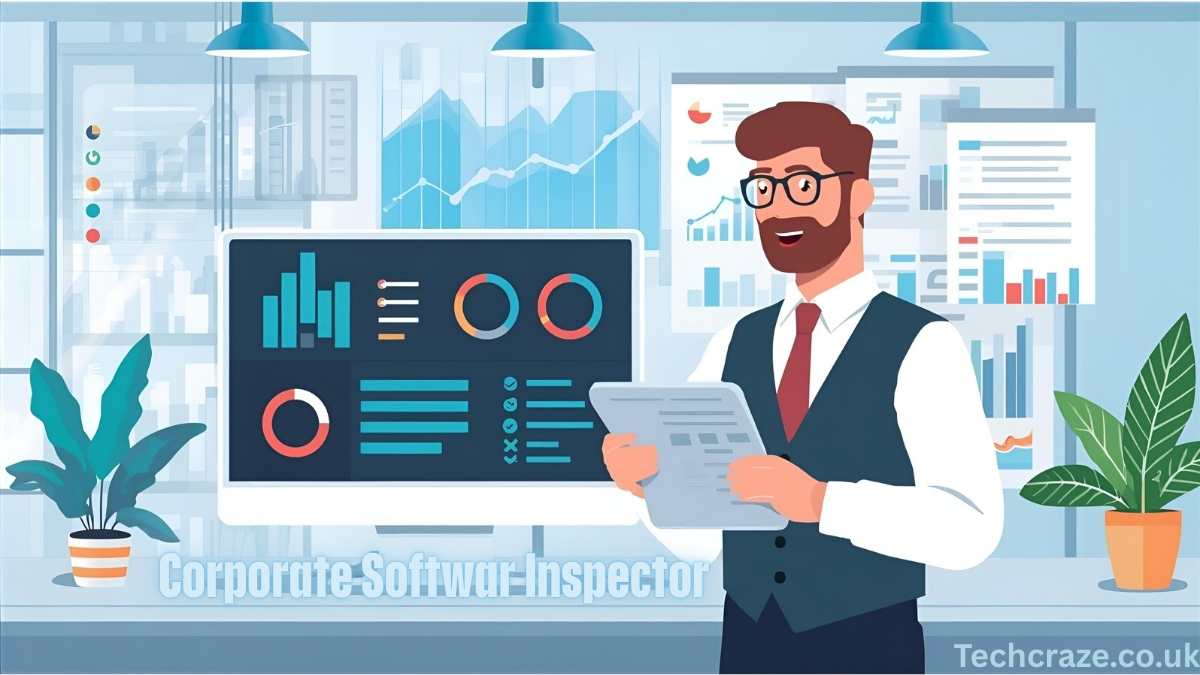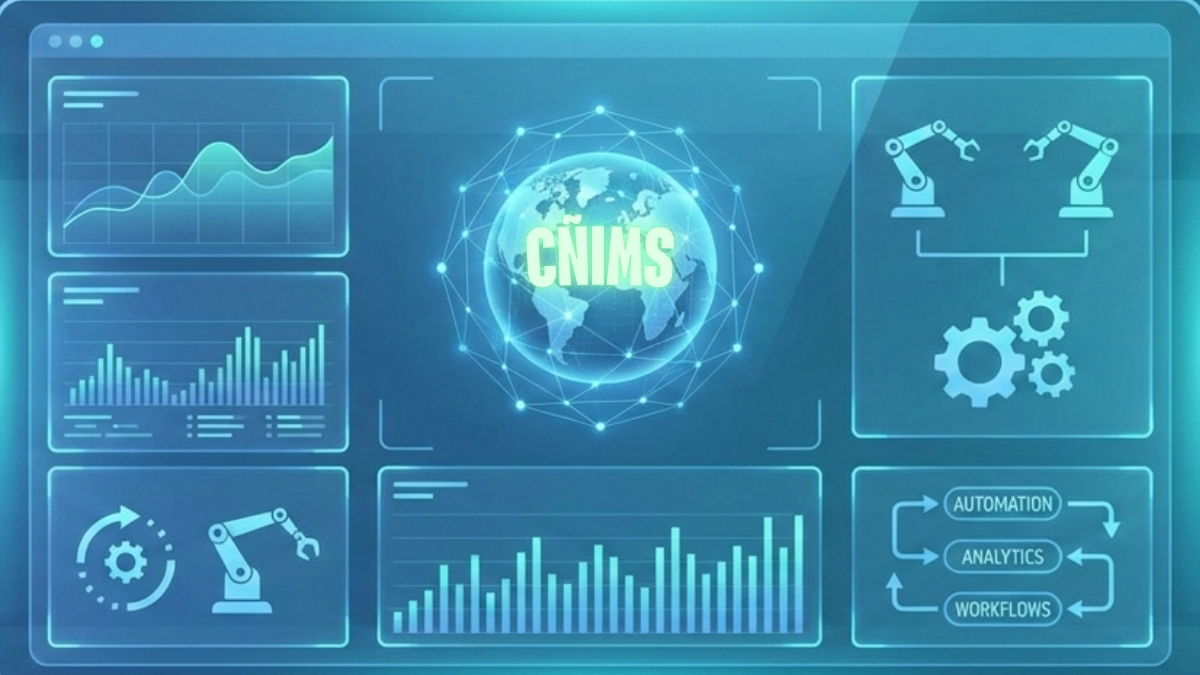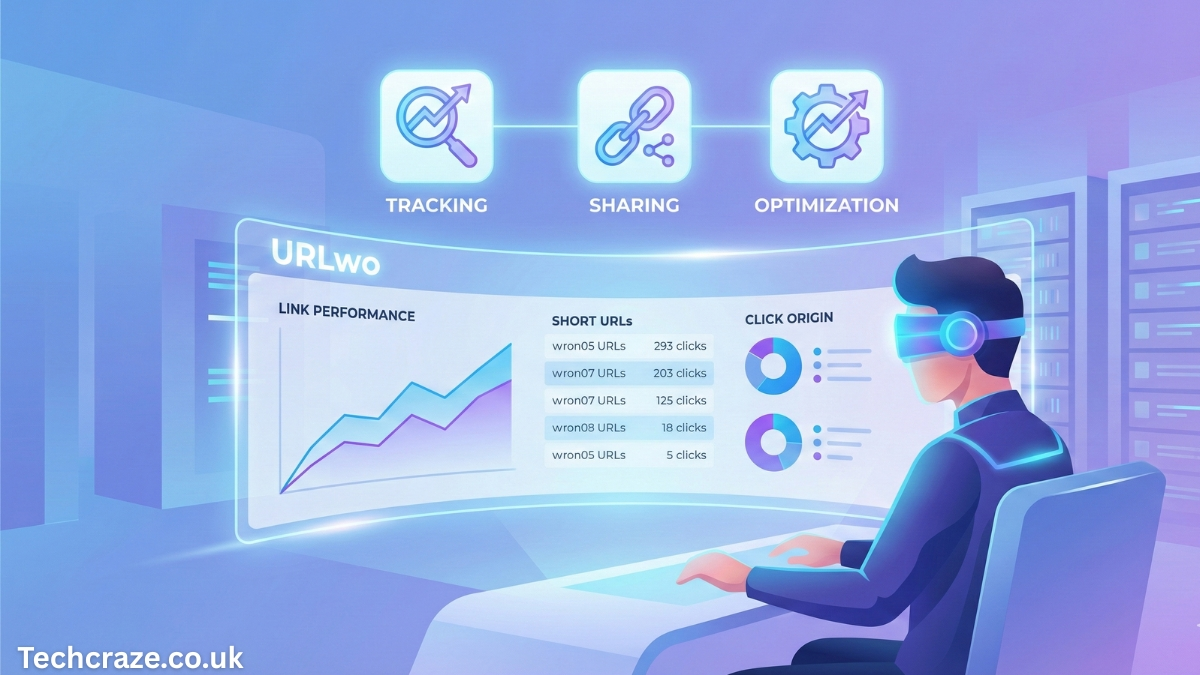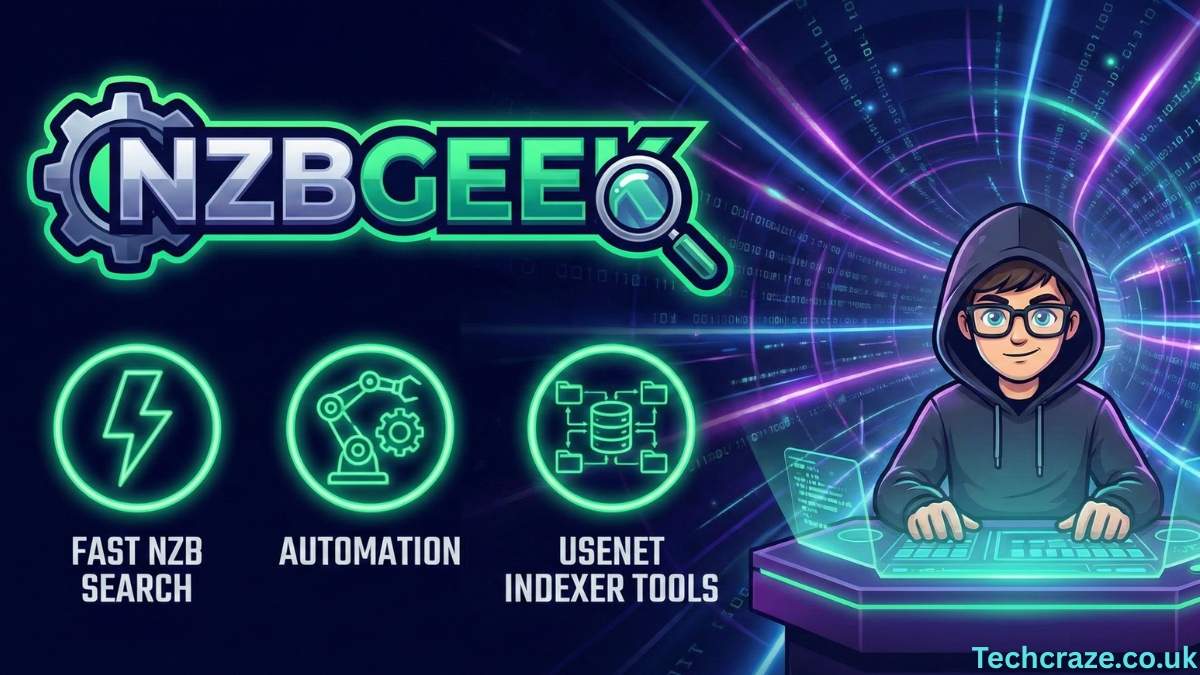Software
Master IT Audits with Corporate Software Inspector

“A Corporate Software Inspector ensures legal, secure, and efficient software use, monitoring licensing, detecting security risks, and assisting in global regulations compliance.”
In modern organizations, software is the backbone of operations. From project management tools to accounting platforms, every corporate process depends on software systems working efficiently and securely. However, with increasing cyber threats and complex licensing rules, businesses need reliable oversight. This is where the Corporate Software Inspector comes in.
A Corporate Software Inspector ensures that all software within a company complies with regulations, meets security standards, and operates at optimal performance. Their role blends technology, compliance, and risk management—making them essential to any digital business environment.
What is a Corporate Software Inspector?
A Corporate Software Inspector is a professional responsible for auditing and monitoring software use within an organization. Their goal is to ensure every installed application is legally licensed, up-to-date, and secure from vulnerabilities.
They perform detailed assessments of corporate systems, track software assets, and identify any unauthorized or outdated programs. Beyond compliance, inspectors also help improve efficiency by recommending better tools or practices for the company’s IT infrastructure.
In many cases, large corporations or government entities employ internal software inspectors, while smaller businesses hire external specialists or consulting firms to perform periodic audits.
Core Responsibilities of a Software Inspector
A Corporate Software Inspector has a broad range of duties that support IT governance and business integrity.
Software Licensing Audits
Inspectors verify that every program in use has a valid license. This helps prevent legal penalties and financial losses caused by unlicensed software. They maintain a central database of licenses and ensure renewals are tracked properly.
Security Vulnerability Checks
They scan systems for potential vulnerabilities, outdated software versions, or malware threats. By ensuring regular patch updates and system maintenance, inspectors help reduce security risks.
Compliance and Policy Enforcement
Inspectors ensure software aligns with internal policies, industry regulations, and global data protection standards such as GDPR or ISO 27001.
Performance and Optimization Analysis
They assess how software impacts system performance. Removing redundant or underused programs can improve operational efficiency and save resources.
Why Companies Need Corporate Software Inspection
Corporate software inspection isn’t just about avoiding fines it’s about protecting digital assets and maintaining business reputation.
Unauthorized software or poor security hygiene can lead to data breaches, ransomware attacks, or loss of confidential information. These incidents not only harm business continuity but also destroy customer trust.
Regular inspections help detect weaknesses early and keep systems compliant with the latest standards. For companies operating in finance, healthcare, or government sectors, software inspection is mandatory for maintaining legal compliance.
The Role in Cybersecurity
With cybercrime on the rise, Corporate Software Inspectors have become an integral part of the cybersecurity strategy.
They collaborate with IT and security teams to identify outdated systems that could serve as gateways for hackers. By continuously monitoring and validating software, inspectors ensure that only secure applications are running.
They also develop incident response plans in case vulnerabilities are found. This proactive approach reduces the chances of large-scale breaches and strengthens the company’s overall defense posture.
Tools and Technologies Used by Inspectors
Software Inspectors use a range of specialized tools to automate and simplify their audits.
Asset Management Software
Platforms like Lansweeper, ManageEngine AssetExplorer, and ServiceNow help track all software assets, licenses, and installations across an organization.
Vulnerability Scanners
Tools such as Nessus, Qualys, and Rapid7 are used to detect vulnerabilities and security risks in corporate systems.
Compliance Management Tools
Inspectors often rely on GRC (Governance, Risk, and Compliance) platforms to ensure adherence to corporate and legal standards.
Using these technologies, inspectors can perform comprehensive assessments faster, minimize human error, and generate detailed reports for decision-makers.
Benefits of Having a Software Inspection System
Implementing a dedicated inspection process brings several long-term benefits for companies.
Improved Compliance
Regular software audits ensure organizations stay compliant with licensing and data protection laws.
Enhanced Security
By identifying and fixing weak points, inspectors protect corporate networks from cyber threats.
Operational Efficiency
Removing unnecessary or duplicate applications can boost productivity and reduce IT costs.
Financial Savings
Avoiding fines and optimizing software investments helps businesses save significant money in the long run.
Challenges Faced by Software Inspectors
While the role is critical, it comes with several challenges.
Rapidly Changing Technology
Keeping up with evolving software versions and compliance standards can be difficult, especially for large organizations.
Resistance from Employees
Employees sometimes resist audits, fearing data exposure or disruptions to their workflow.
Integration Complexities
Inspectors often face challenges when integrating different software systems across departments or legacy platforms.
To overcome these, successful inspectors rely on strong communication, automation tools, and continuous learning.
Corporate Software Inspector vs. IT Auditor
While their work overlaps, a Corporate Software Inspector focuses mainly on software compliance and optimization. In contrast, an IT Auditor reviews the entire IT infrastructure, including hardware, processes, and governance frameworks.
Inspectors may work alongside IT auditors to ensure both hardware and software systems meet organizational and regulatory standards.
The Future of Software Inspection
The demand for Corporate Software Inspectors is growing as digital transformation accelerates. With AI and machine learning entering the field, inspections are becoming more predictive and data-driven.
Future inspectors may use AI tools that automatically detect compliance issues, flag risks, and even recommend updates in real time. This shift will reduce manual work and improve audit accuracy.
As companies continue to expand their digital ecosystems, the need for skilled inspectors will remain crucial in protecting business integrity and ensuring sustainable technology growth.
Conclusion
The Corporate Software Inspector plays a silent yet vital role in ensuring a company’s digital health. From maintaining compliance to securing systems, they help businesses run smoothly, efficiently, and lawfully.
In an age where every click matters, software inspection isn’t just a technical formality it’s a strategic necessity. Investing in skilled inspectors and modern auditing tools can save organizations from costly errors, strengthen cybersecurity, and pave the way for long-term success.
FAQs
What does a Corporate Software Inspector do?
A Corporate Software Inspector audits, monitors, and manages software use within a company to ensure compliance, security, and performance efficiency.
Why is software inspection important for businesses?
It helps prevent legal issues, strengthens cybersecurity, and improves productivity by keeping all software updated and licensed.
How often should companies conduct software inspections?
Ideally, businesses should perform software inspections quarterly or at least twice a year, depending on their size and industry.
What tools do software inspectors use?
They use asset management tools, vulnerability scanners, and compliance software to track, analyze, and report on corporate software.
Can small businesses benefit from software inspection?
Yes, even small companies benefit by reducing risks of data breaches and avoiding unnecessary software costs.
Software
CÑIMS: Intelligent Management System for Smart Operations

In today’s digital-first world, organizations are increasingly relying on intelligent systems to manage data, operations, and decision-making processes. As businesses grow more complex, traditional manual management methods struggle to keep up with speed, accuracy, and scalability. This growing challenge has led to the evolution of integrated management systems designed to streamline workflows and improve efficiency.
CÑIMS emerges as a modern concept that represents a centralized, intelligent management framework. It focuses on connecting data, processes, and insights into a unified system that supports smarter decisions and better performance across different sectors.
As digital transformation accelerates, platforms and systems like CÑIMS are becoming essential tools rather than optional upgrades.
What Is CÑIMS? A Conceptual Overview
CÑIMS stands for a centralized and intelligent management system designed to integrate multiple operational functions into one cohesive platform. Instead of using disconnected tools, CÑIMS enables organizations to manage workflows, analytics, and reporting in a single environment.
The core idea behind CÑIMS is simplification through intelligence. By combining automation, data integration, and smart insights, it reduces manual workload and minimizes errors. This makes operations more reliable and scalable over time.
CÑIMS is not limited to a single industry. Its flexible structure allows it to adapt to business, education, healthcare, logistics, and administrative environments.
The Purpose and Vision Behind CÑIMS
The primary purpose of CÑIMS is to create clarity in complex systems. Modern organizations generate massive amounts of data, but without proper structure, that data becomes difficult to manage or analyze effectively.
CÑIMS aims to turn raw data into actionable intelligence. By organizing information and applying intelligent logic, it helps users understand patterns, track performance, and identify opportunities for improvement.
The long-term vision of CÑIMS is to enable smarter ecosystems where technology supports human decision-making rather than complicating it.
Core Features of the CÑIMS Framework
One of the defining characteristics of CÑIMS is its centralized dashboard. This allows users to monitor activities, metrics, and performance indicators from a single interface, saving time and improving visibility.
Another key feature is automation. Routine tasks such as reporting, scheduling, and data synchronization can be handled automatically, reducing human error and operational delays.
CÑIMS also emphasizes adaptability. The system can be customized based on organizational needs, ensuring relevance across different workflows and industries.
How CÑIMS Improves Operational Efficiency
Efficiency is a major challenge for growing organizations. Disconnected systems often lead to duplicated work, data inconsistencies, and communication gaps. CÑIMS addresses these issues by integrating all processes into one streamlined system.
With real-time data access, teams can respond quickly to changes and make informed decisions. This reduces downtime and improves productivity across departments.
By eliminating unnecessary manual steps, CÑIMS allows teams to focus on strategic tasks rather than routine administration.
CÑIMS and Data Management
Data is the backbone of any modern organization, and CÑIMS places strong emphasis on structured data management. It ensures that information is stored securely, accessed efficiently, and updated consistently.
Through intelligent categorization and filtering, users can easily retrieve relevant data without navigating complex databases. This improves accuracy and saves valuable time.
CÑIMS also supports data-driven decision-making by transforming stored information into meaningful insights and reports.
The Role of Intelligence and Automation in CÑIMS
Intelligence within CÑIMS refers to its ability to analyze data patterns and assist users with insights. Rather than simply storing information, the system helps interpret it.
Automation plays a critical role by handling repetitive tasks such as alerts, updates, and routine checks. This reduces operational workload and increases reliability.
Together, intelligence and automation make CÑIMS a proactive system rather than a passive data repository.
CÑIMS in Business and Enterprise Environments
In business environments, CÑIMS supports management by aligning operations with organizational goals. Leaders gain a clearer view of performance metrics, helping them make strategic decisions.
For teams, the system improves collaboration by providing shared access to updated information. This reduces misunderstandings and enhances coordination.
CÑIMS also supports scalability, allowing businesses to grow without losing control over processes and data.
Applications of CÑIMS in Education and Institutions
Educational institutions face unique challenges related to administration, reporting, and performance tracking. CÑIMS can streamline these processes by centralizing academic and operational data.
Administrators benefit from improved reporting and planning tools, while educators gain access to insights that support better learning outcomes.
By reducing administrative burden, CÑIMS allows institutions to focus more on education quality and student engagement.
Security and Reliability in CÑIMS
Security is a critical concern in digital systems, and CÑIMS prioritizes data protection. Controlled access, authentication, and monitoring help safeguard sensitive information.
Reliability is equally important. CÑIMS is designed to ensure consistent performance, minimizing system downtime and data loss risks.
These measures build trust and make the system suitable for long-term use in sensitive environments.
User Experience and Accessibility
A system’s success depends largely on its usability. CÑIMS emphasizes a user-friendly interface that is easy to navigate, even for non-technical users.
Clear layouts, intuitive controls, and logical workflows help users adapt quickly. This reduces training time and increases adoption rates.
Accessibility across devices ensures that users can interact with the system whenever and wherever needed.
Benefits of Implementing CÑIMS
Implementing CÑIMS offers multiple benefits, including improved efficiency, better data visibility, and enhanced decision-making capabilities.
Organizations experience reduced operational costs as automation replaces manual processes. Accuracy and consistency also improve significantly.
Overall, CÑIMS supports sustainable growth by creating a stable and intelligent operational foundation.
Challenges and Considerations
Like any system, CÑIMS implementation requires careful planning. Organizations must clearly define their goals and requirements before adoption.
Change management is another consideration. Teams need proper guidance and training to fully leverage the system’s capabilities.
Addressing these challenges early ensures smoother implementation and long-term success.
The Future Potential of CÑIMS
The future of CÑIMS lies in deeper intelligence and smarter automation. As technologies evolve, systems like CÑIMS can incorporate advanced analytics and predictive insights.
Integration with emerging technologies may further enhance efficiency and adaptability. This positions CÑIMS as a forward-looking solution.
As digital ecosystems continue to grow, intelligent management systems will become even more essential.
Why CÑIMS Matters in the Digital Era
In an era defined by data and speed, managing complexity effectively is crucial. CÑIMS provides a structured yet flexible approach to handling modern challenges.
By aligning technology with human decision-making, it creates balance between automation and control.
CÑIMS matters because it empowers organizations to operate smarter, not harder.
Conclusion: CÑIMS as a Smart Management Solution
CÑIMS represents a modern approach to intelligent management, combining data integration, automation, and user-focused design. It addresses the growing need for clarity, efficiency, and adaptability in complex environments.
Through centralized control and intelligent insights, CÑIMS helps organizations unlock the true value of their data. It supports better decisions, smoother operations, and sustainable growth.
As digital transformation continues, systems like CÑIMS will play a vital role in shaping the future of efficient management.
FAQs
What is CÑIMS used for?
CÑIMS is used to centralize operations, manage data efficiently, and support intelligent decision-making through automation and analytics.
Is CÑIMS suitable for small businesses?
Yes, CÑIMS can be adapted for both small organizations and large enterprises due to its flexible and scalable structure.
How does CÑIMS improve efficiency?
It reduces manual work by automating routine tasks and integrating multiple systems into a single platform.
Is CÑIMS industry-specific?
No, CÑIMS is designed to work across multiple sectors including business, education, healthcare, and administration.
Does CÑIMS support digital transformation?
Yes, CÑIMS plays a key role in digital transformation by enabling data-driven operations and smarter workflows.
Software
URLwo: Smart Link Shortening & URL Management for Modern Creators

“URLwo is a simple link-management tool that lets users shorten long URLs, customize them for branding and track link performance through basic analytics. It helps bloggers, marketers and businesses improve link organization, increase click-through rates and create cleaner, more professional URLs for social media, websites and digital campaigns.”
The digital world runs on links. Whether you’re promoting a blog, sharing resources on social media or building an online business, the URLs you share play a major role in how people interact with your content. This is exactly why tools like URLwo have become popular among marketers, creators and website owners who want more control over their links.
URLwo is known for offering link-related features that help you shorten, organize, track and optimize URLs for better performance. It is useful for bloggers, businesses and anyone looking to improve online reach. In this guide, we’ll explore what URLwo is, how it works, the features it provides and how you can use it for digital growth.
What Is URLwo and Why Is It Used?
URLwo is an online link-management tool designed for creating short, clean and shareable URLs. Long or complex links can look unprofessional and often discourage users from clicking. URLwo solves this by turning bulky URLs into simple, branded or trackable links.
Shortened URLs are easier to share on social media, messaging apps, websites and newsletters. They improve user experience and help creators build a more organized link structure. Beyond shortening, URLwo also supports analytic features that show how links are performing. This makes it helpful for bloggers, advertisers and businesses tracking engagement.
Another reason URLwo stands out is its ease of use. Even users with no technical experience can shorten links or manage campaigns within seconds. This combination of simplicity and functionality makes it a valuable tool in modern digital marketing.
How URLwo Helps Bloggers and Content Creators
For bloggers, link optimization is essential. If you’re publishing articles daily, sharing your work across multiple platforms or linking out to references, URLwo can streamline the entire process. It keeps your links clean and organized, reducing clutter in posts and social shares.
Bloggers can also use URLwo to monitor which platforms drive traffic. When sharing new posts on Facebook, WhatsApp, Twitter or LinkedIn, unique short URLs allow you to track the exact source of clicks. This helps you understand what your audience prefers.
Creators who rely on affiliate marketing benefit even more. Long affiliate links tend to appear spam-like. URLwo fixes this by making them professional and easy to trust. Clean links naturally lead to better click-through rates, which means more revenue.
URL Shortening Features of URLwo
One of the core features of URLwo is fast and reliable URL shortening. You can paste any long link and get a shortened version instantly. These short links work seamlessly across devices, platforms and browsers.
The shortener also aims to maintain link stability, meaning your links remain active and accessible over time. This is particularly helpful for evergreen content or long-term marketing campaigns. Users can also store their shortened URLs inside the platform for future use, keeping their digital toolbox organized.
Another benefit is link customization. Many link shorteners give generic, random character URLs. URLwo often allows users to personalize the keyword portion, giving links a branded touch. This gives you more control and helps build recognition among your audience.
Link Tracking and Analytics in URLwo
Tracking is a huge part of link optimization. URLwo provides basic analytics that show how your links perform over time. Understanding link performance helps businesses refine strategies and improve engagement.
These analytics typically include the number of clicks, the source of traffic and sometimes geographical insights. Even simple data can be powerful when making decisions about where to invest your marketing energy.
For example, if a link gains more clicks from Instagram than Facebook, you can redirect your efforts toward Instagram. Bloggers can use this information to plan better content distribution strategies and maximize visibility.
Using URLwo for Social Media Marketing
Social media thrives on short, neat and engaging links. Long URLs disrupt flow and often get trimmed automatically by platforms. URLwo gives marketers control by creating professional-looking links that capture attention.
Short URLs also blend well with captions, branded posts and carousel content. When you’re running campaigns or promotions, URLwo allows you to share multiple links efficiently without overwhelming users with clutter.
Influencers and small businesses can also create unique links for each social platform. This helps track exactly which audience responds best. Over time, these insights lead to more targeted posting and improved growth.
URLwo for Business and Brand Promotion
Businesses require consistent branding across all online channels. URLwo supports this by helping companies maintain a clean digital presence. Branded or customized links build trust and can even increase conversions.
For marketing agencies, URLwo can serve as an internal tool for managing dozens of campaigns. Each client’s links can be organized, shortened and monitored separately. The ability to check click performance also helps agencies create monthly reports.
Small businesses can use URLwo to share product pages, promotional offers or customer forms with ease. Short links work well in SMS campaigns, email newsletters and advertising posts. Since they take less space and look more professional, they naturally encourage engagement.
How URLwo Improves User Experience (UX)
Clean URLs lead to better experiences for your audience. Users prefer clicking short links because they appear safe, organized and intentional. This subtle improvement often results in higher trust and smoother navigation.
In blog posts, shorter URLs also look better visually. They keep your article layout clean and prevent distracting clutter. For users reading on mobile devices, short links are much easier to interact with.
UX improvements extend to creators as well. Managing and updating links becomes faster, especially if you maintain a big content library. Instead of digging through long URLs, you can reuse simple short links or update them easily inside URLwo.
Who Should Use URLwo?
URLwo works well for a variety of users. Bloggers, influencers, marketers, freelancers and business owners can all benefit from its simple and organized link tools.
Students and researchers can also use it for projects requiring clean references. Teachers may use shortened links for digital assignments or classroom materials. Event organizers can create short shareable links for registrations or tickets.
In general, anyone who shares links frequently or needs organized tracking will find URLwo extremely helpful.
Tips to Use URLwo More Effectively
To get the most out of URLwo, start by organizing your categories. Group links by content type, platform or campaign. This makes retrieval easier when you need to reuse or update them.
Creating unique URLs for different social platforms helps optimize distribution. You can compare results later and identify which platform offers the best return on time or budget.
Finally, pay attention to analytics. Even basic insights can guide you toward better posting habits and higher engagement. Make link performance part of your content strategy and you’ll see a noticeable difference.
Conclusion
URLwo is a simple yet powerful link-management tool that helps shorten, organize and track URLs. It’s useful for bloggers, businesses and digital marketers who want a more polished and strategic approach to sharing links. With cleaner aesthetics, better tracking and smooth user experience, URLwo offers a practical way to strengthen your online presence.
If you’re building a blog, promoting content or running online campaigns, integrating a tool like URLwo can save you time while improving your overall performance.
FAQs
What is URLwo used for?
URLwo is an online tool that helps you shorten, manage and track URLs. It is commonly used by bloggers, marketers and businesses to keep links clean and monitor their performance.
Is URLwo safe for creating short links?
Yes, URLwo is generally safe for shortening URLs. It generates stable and reliable links that work well across social media platforms, browsers and devices.
Can URLwo track clicks on my links?
URLwo offers basic analytics that show how many clicks your link receives, along with other engagement insights. This helps users understand which platforms drive the most traffic.
Is URLwo helpful for bloggers and content creators?
Absolutely. Bloggers use URLwo to organize links, clean up long URLs and monitor engagement from different platforms. This leads to better content management and higher click-through rates.
Does URLwo support customized short URLs?
Yes, URLwo often allows users to customize the keyword part of the short link. This helps in branding and improves trust among audiences.
Software
NZBGeek: Fast NZB Search, Automation & Usenet Indexer Tools

NZBGeek is one of the most well-known Usenet indexing platforms used by people who want fast, organized and reliable access to Usenet content. Instead of manually navigating thousands of newsgroups, NZBGeek creates a smooth search experience by collecting, curating and indexing NZB files in an easy-to-browse format. Over the years, it has built a strong reputation for its active community, clean interface and consistent performance.
Users often choose NZBGeek because it strikes a balance between simplicity and powerful features. Whether someone is new to Usenet or already familiar with indexers, they usually find the platform easy to adapt to. It integrates well with many Usenet clients, supports automation tools and offers refined search filters that make it simple to discover high-quality NZBs.
Another reason behind its popularity is NZBGeek’s long-standing presence in the Usenet ecosystem. While many indexers come and go, NZBGeek continues to stay stable thanks to its large member base and proactive backend management. This consistency builds trust, especially in a space where reliability matters.
How NZBGeek Works
At its core, NZBGeek functions as an indexing service rather than a file host. It does not store downloads directly. Instead, it scans Usenet newsgroups, finds posts, generates structured NZB files and presents them in categories users can easily explore. When a user selects an NZB file, it simply tells their newsreader where to fetch the content from.
This system keeps NZBGeek fast and lightweight. Because it focuses only on indexing, users experience smooth navigation without delays. Searching is also more efficient because the platform uses well-tuned filters and metadata tagging to highlight clean and complete posts. This ensures fewer dead links and a better overall download success rate.
Another key point is how NZBGeek integrates with automation tools like Sonarr, Radarr, Lidarr and NZBGet. Automation is a major advantage for advanced users. With a proper setup, NZBGeek can automatically deliver NZBs to your newsreader as soon as matching content becomes available. This reduces manual searching and makes the user experience seamless.
Main Features of NZBGeek
One of NZBGeek’s biggest strengths is its feature-rich interface. It offers powerful search filters, category-based browsing and advanced sorting options. These help users pinpoint exactly what they want without combing through irrelevant results. NZBGeek also offers a “GeekSeek” advanced search mode, which is especially useful for users who know what they’re looking for and want precise filtering.
Another notable feature is NZBGeek’s community-driven structure. Members regularly contribute by reporting issues, improving categories and helping new users. This keeps the index fresh and up-to-date. The platform also uses smart completion checks to ensure higher NZB quality, minimizing failed downloads or incomplete posts. This makes it more efficient compared to basic free indexers.
The site also supports integrations with multiple newsreaders and automation tools. Whether you’re using SabNZBD, NZBGet, Sonarr or Radarr, NZBGeek works smoothly. These integrations improve speed, accuracy and convenience for users who prefer hands-off automation.
Why NZBGeek is Popular Among Usenet Users
NZBGeek stands out because it offers a clean balance of affordability and performance. Many premium indexers charge high prices, but NZBGeek keeps its membership costs comparatively low while offering excellent indexing quality. This affordability makes it accessible to beginners who want to explore the Usenet ecosystem without overspending.
Users also appreciate NZBGeek’s reliability. New content is indexed quickly, search results are consistently accurate and automation rarely breaks. In a field where stability matters, NZBGeek excels by maintaining uptime and strong backend monitoring. This means users can trust the platform for both manual searching and automated workflows.
Another reason behind its popularity is the sense of community. Unlike fully automated indexers with no support or interaction, NZBGeek offers an active forum where users exchange tips, troubleshooting advice and recommendations. This community-driven support improves the user experience and helps newcomers understand Usenet more easily.
NZBGeek vs Other Usenet Indexers
When compared with other indexers, NZBGeek usually scores high on value and usability. Many indexers lack proper completion checks, which leads to a lot of broken NZBs. NZBGeek’s quality control system reduces such problems, making it a more dependable choice. Its simple interface also gives it an edge over platforms that rely on overly complex navigation.
Another standout comparison point is community activity. Some indexers rely entirely on automated bots, leaving outdated or low-quality content untouched. NZBGeek, on the other hand, blends automation with user-driven improvements. This combination results in cleaner results, better categorization and faster issue resolution.
Pricing is another area where NZBGeek shines. While some indexers charge premium fees, NZBGeek keeps its membership affordable without sacrificing features. Users get good value, reliable indexing and smooth integration without paying extra for basic access.
Membership Options and Pricing
NZBGeek offers multiple membership plans, usually categorized into short-term, long-term and lifetime access. These plans are designed to meet the needs of different users. Beginners often start with monthly or quarterly plans, while experienced Usenet users may choose long-term or lifetime memberships for added value.
The pricing is generally lower than many premium indexers. Even with an affordable cost, NZBGeek delivers a premium experience with high-quality results and automation support. This combination of affordability and strong features is one of the main reasons for its popularity in the Usenet community.
Paid memberships also unlock extra search filters, API access for automation tools, and a faster indexing rate. This means users who depend on automation or frequent downloads benefit significantly from the premium options.
Safety and Privacy Considerations
NZBGeek focuses on indexing rather than hosting content, which limits its exposure to direct security risks. It also uses secure browsing (HTTPS) and encourages users to connect through secure Usenet providers that offer SSL encryption. This layer of encryption helps protect user activity from unwanted monitoring.
Users should also ensure they use a reputable Usenet provider alongside NZBGeek. While NZBGeek is responsible for indexing, the actual downloads come from your provider. Choosing a provider with strong retention, fast speeds and SSL support enhances safety and performance.
Although NZBGeek itself doesn’t track downloads, users should still follow safe practices. Using secure automation tools, protecting API keys and using updated software helps ensure a safe and stable experience.
Is NZBGeek Worth Using?
For anyone who is serious about using Usenet, NZBGeek is a strong option. It offers a reliable index, active community support, powerful automation capabilities and affordable pricing. These features make it suitable for both beginners and advanced users.
The platform’s stability and consistent indexing make it a trustworthy long-term choice. Users rarely encounter major downtime or broken features. Its support for automation tools also makes it ideal for people who want a hands-off setup that runs smoothly with minimal manual searching.
Overall, NZBGeek offers great value. It blends simplicity, usability and quality indexing, placing it among the top Usenet indexers available today.
Conclusion
NZBGeek has become a go-to Usenet indexer because it delivers reliability, strong features and smooth integrations at an affordable price. Its community involvement, search accuracy and automation support make it ideal for newcomers and long-time Usenet enthusiasts. Whether you prefer manual browsing or a fully automated setup, NZBGeek provides a dependable and user-friendly experience.
FAQs
What is NZBGeek?
NZBGeek is a community-driven Usenet indexer that helps users find and download NZB files quickly. It organizes Usenet posts into searchable categories and integrates smoothly with automation tools like Sonarr, Radarr and NZBGet.
Is NZBGeek free to use?
NZBGeek offers limited free access, but most users choose a paid membership for better search results, API access, faster indexing and integration with automation tools. The pricing is affordable compared to other premium indexers.
Does NZBGeek host files?
No. NZBGeek only indexes Usenet content. It creates NZB files that point your newsreader toward the correct Usenet server location. The actual download happens through your Usenet provider, not the indexer.
Is NZBGeek safe?
Yes, NZBGeek uses secure browsing and does not host any files directly. For full safety, you should pair it with a reputable Usenet provider that supports SSL encryption. Using secure tools and protecting your API keys also adds extra safety.
Can I automate downloads with NZBGeek?
Absolutely. NZBGeek integrates well with automation tools like Sonarr, Radarr, Lidarr, NZBGet and SABnzbd. These tools can automatically grab NZB files based on your filters and send them to your newsreader without manual searching.
-

 Crypto11 months ago
Crypto11 months agoCrypto30x.com Gemini: A Deep Dive into the Future of Crypto
-

 Blog11 months ago
Blog11 months agoFeedbackMagazines.org/: A Hub for Engaging Content
-

 News9 months ago
News9 months agoCristian Romero Opens Door to Tottenham Exit as Atletico Madrid Eyes £43 Million Move for Argentina Star
-

 News9 months ago
News9 months agoNancy Mace Faces Criticism and Support After Heated Exchange With Trans Activist at South Carolina Event
-

 Tech11 months ago
Tech11 months agoExploring Eporer: The Digital Revolution You Need to Know
-

 News9 months ago
News9 months agoPassengers From Luxury Rovos Rail Train Thank Zimbabwe for Support as They Arrive in Victoria Falls After Collision Near Gwanda
-

 Crypto11 months ago
Crypto11 months agoCrypticStreet.com Guides: Your Ultimate Resource Hub
-

 Tech11 months ago
Tech11 months agoKingxomiz: Unlocking Innovation and Personal Growth

